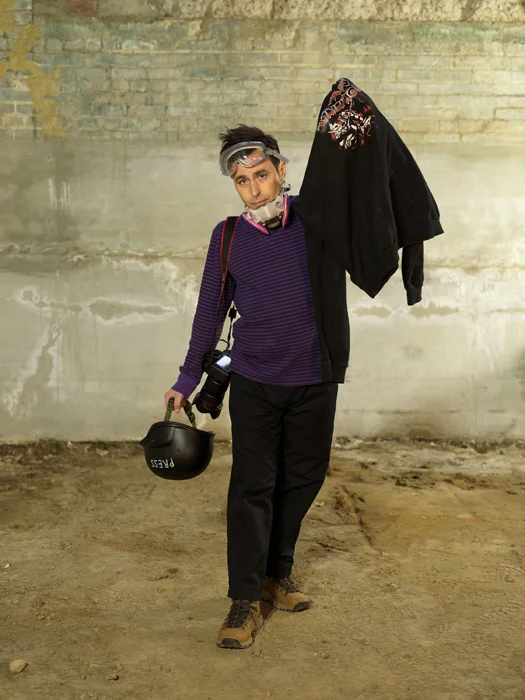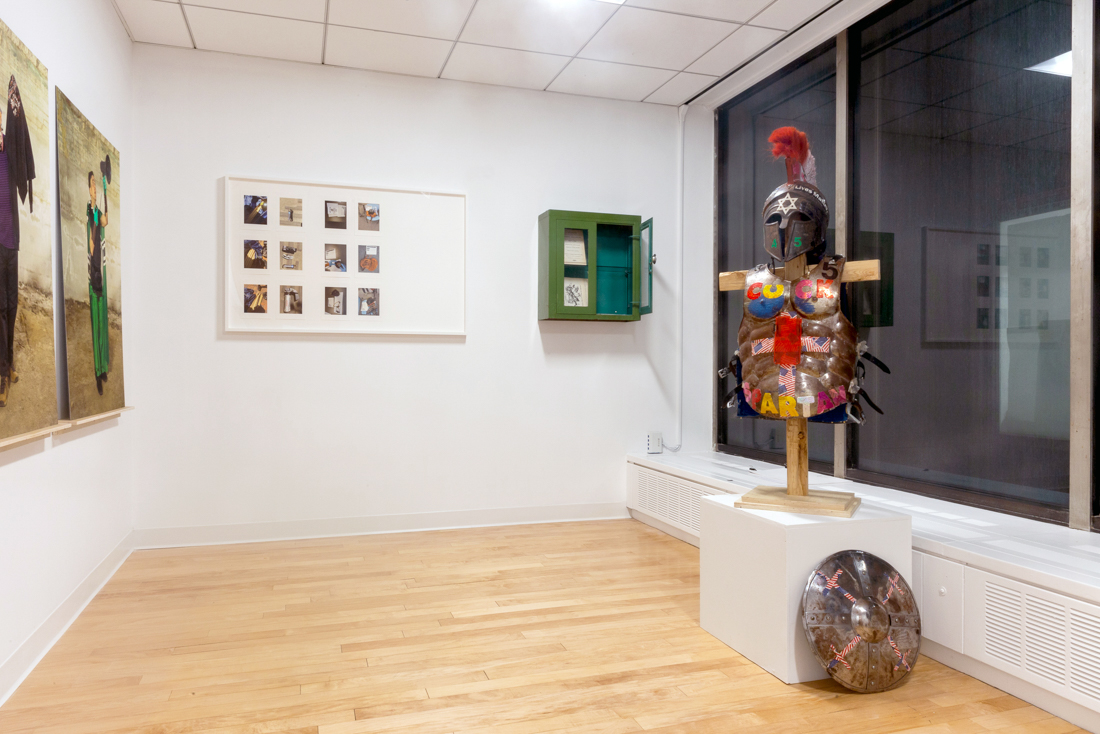Copernicus in Retrograde
JOSHUA LIEBOWITZ
Curated by Jen Hitchings
SPRING/BREAK Art Show
866 United Nations Plaza, NY, NYMarch 5-11, 2019
Booth S14
Copernicus in Retrograde, a multi-media installation by Joshua Liebowitz, considers American grief by the artist positioning himself as a subject searching for dialogue within the increasingly disjointed chorus of social viewpoints emanating from right and left protest culture. Among the plethora of images circulating from demonstrations and counter-demonstrations that took place in Charlottesville, Berkeley, and Portland, Liebowitz noticed individuals donning highly creative, cosplay-like battle costumes, adorned with elaborate regalia. That the creators of this attire repeatedly show up, mimicking and outdoing the uniforms of their perceived enemies, suggests not hardened political or ideological positions, but rather a desire to express and perform versions of themselves. “Leadership is barely at hand in the world right now, so I find myself empathizing with their desire for fantasy,” Liebowitz states. “Within the arena of protest, their attire establishes a stickiness; a direction. Unfortunately, it’s like a continuation of the physical, albeit hollow manifestation of their meme victory for one side; and for the other, a misstep toward the same type of emptiness, under the rubric of anarchy. In that theater, the symbols seem to operate on their own, performing a parallel version of the online virality that helped fragment society in the first place. But with real world consequences resulting from the actions of their creators, they end nowhere in particular but mayhem.”
In conceptualizing this project, Liebowitz wanted to reinscribe the symbols in their recognizable language of possibility instead of the measurable outcome of violence. Reading the costumes in this manner became a desire to delineate fantasy, to document narrative through dialogue. Contacting the makers of these costumes on the other side of the screen and outside the realm of physical protest became a way to contextualize his own confusion over what constitutes the real world right now. Asking the creators of these outfits to trust him enough to let him take their gear back to his side of the divide and to don the regalia himself in a series of self-portraits is his way of acknowledging the need for a space where expression is not threatened into self-censorship by one side or another.
In contrast, Liebowitz’s Munitions (2019) is a tether to the consequences of needing to create such an arena in the first place. Obtained by Freedom of Information Act request, then reprinted and marked, this collection of evidence photos taken by the Portland Police Bureau depicts various weapons seized at the “Patriot Prayer” rally in Portland, Oregon, in 2018. We see the homespun armaments prepared by members of Antifa and the Alt-Right, and crucially, are provided a view of the internal narrative offered by the Portland authorities.
Lastly, included in the installation is Liebowitz’s work as conflicted custodian of a pamphlet titled “Some Reasons for Chinese Exclusion. Meat vs. Rice. American Manhood against Asiatic Coolieism. Which Shall Survive,” published in 1901 by the American Federation of Labor. Clearly relevant to present issues concerning the men’s rights movement, which in turn influenced the multitude of meme workers who helped turn the 2016 election, this text demonstrates how fraudulent historical narratives can be woven into desired outcomes; in the case of this pamphlet, supporting the continuation of the Chinese Exclusion Act of 1882, and precipitating the arguably harsher Immigration Act of 1924.
This carefully considered arrangement of material and documentation of staged actions by Liebowitz exemplifies his ongoing investigation of cultural trends while scrutinizing the societal systems that fuel them. By representing objects and texts that are inherently controversial in their original intent in a vastly different context, he illuminates the nuanced poetic and formal decisions made by groups often ideologically at odds with the art world, while drawing parallels regarding censorship and expression that have become a point of contention within the art world. This newly constructed universe appears to turn back the clock of American history, as we find ourselves in something of a cultural retrograde.
Artist Bio
Joshua Liebowitz is a New York–based artist working with research and varied materials. His multimedia projects often combine processes of investigative journalism, documentary, and historical methods together with speculative fiction, poetics, and absurdist intervention. His installations have been shown at CAFA International Gallery, Beijing; Transmitter, New York; Pioneer Works, The Boiler|Pierogi, and NARS Foundation (New York), among others. Liebowitz has received commissions from The Poetry Project at St. Mark’s Church; Flux Factory; and his works have been discussed in a variety of publications, including The Atlantic, ArtFCity, Huffington Post, Jacket 2, Packet BiWeekly, and Bedford+Bowery. He is a current resident at the International Studio and Curatorial Program (iscp, Brooklyn, NY).
The artist would like to thank the Turano Family, Alexei Wood, Jaime Iglehart, Dario Lasagni, Andrew Ohanesian, Ian Swanson, Andre Ribuoli & Jennifer Mailman-Ribuoli, Carlo Ferraris, Transmitter, and iscp: International Studio & Curatorial Program with Ground Floor Residency sponsorship by Yoko Ono, Alice and Lawrence Weiner, New York City Department of Cultural Affairs, in partnership with the City Council, New York City Council District 34, Jacques and Natasha Gelman Foundation, Danna and Ed Ruscha, New York State Council on the Arts with the support of Governor Andrew M. Cuomo and the New York State Legislature.







